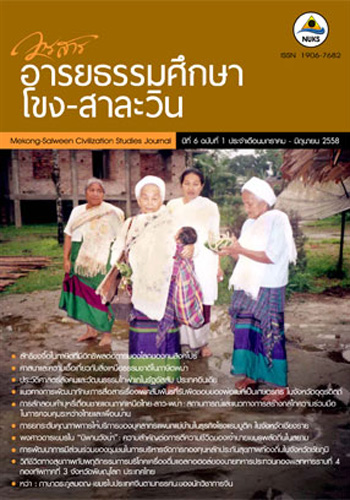วิถีชีวิตทางสุขภาพกับพฤติกรรมการบริโภคเครื่องดื่มแอลกอฮอล์ของนายทหารประทวน กองพลทหารราบที่ 4 กองทัพภาคที่ 3 จังหวัดพิษณุโลก ประเทศไทย
Main Article Content
บทคัดย่อ
การศึกษาครั้งนี้มีวัตถุประสงค์ 2 ประการประกอบด้วย 1) เพื่อวิเคราะห์สภาวะสุขภาพของนายทหารประทวนกองพลทหารราบที่ 4 กองทัพภาคที่ 3 จังหวัดพิษณุโลก 2) เพื่อวิเคราะห์บริบททางสังคม สถานการณ์การบริโภคเครื่องดื่มแอลกอฮอล์ของนายทหารประทวน กองพลทหารราบที่ 4 กองทัพภาคที่ 3 จังหวัดพิษณุโลก ศึกษาจากนายทหารประทวนจำนวน 700 นาย โดยผู้วิจัยใช้ระเบียบวิธีวิจัยแบบผสม ระหว่างการวิจัยเอกสารและการวิจัยเชิงปริมาณ วิเคราะห์ข้อมูลด้วยสถิติพรรณาและสถิติอนุมาน ผลการศึกษาปรากฏดังนี้
สภาวะสุขภาพของนายทหารประทวน กองพลทหารราบที่ 4 กองทัพภาคที่ 3 พบว่ามีภาวะความผิดปกติของดัชนีมวลกายเกินเกณฑ์ ร้อยละ 94.9 มีผลการตรวจชีวเคมีในเลือดผิดปกติสูงในประเภท Cholesterol, Triglyceride, LDL-C และGlucose ซึ่งเป็นข้อบ่งชี้ถึงการมีความเสี่ยงสูงต่อการเกิดโรคเรื้อรัง ในโรคหลอดเลือดอุดตัน โรคตับ และโรคเบาหวาน
ด้านพฤติกรรมการบริโภคเครื่องดื่มแอลกอฮอล์ พบว่ามีระดับการบริโภคแบบติดร้อยละ 30.4 การบริโภคเครื่องดื่มแอลกอฮอล์ มีความสัมพันธ์อย่างมีนัยสำคัญทางสถิติ กับการเพิ่มขึ้นของดัชนีมวลกายที่ r = 0.45, P = 0.01 ส่วนผลกระทบทางด้านสังคม เช่น ปัญหาครอบครัว ปัญหาการขาดงาน การสูญเสียสมรรถภาพการทำงาน การเสียชีวิตจากอุบัติเหตุไม่พบหลักฐานเชิงประจักษ์ในหน่วยงาน
จากการวิเคราะห์ ด้านนโยบายการควบคุมเครื่องดื่มแอลกอฮอล์ พบว่ามีการจำกัดสถานที่การบริโภค ลดช่องทางเข้าถึงเครื่องดื่มแอลกอฮอล์ ผู้บังคับบัญชาเป็นผู้นำในการลดการบริโภค โดยการแสดงเป็นตัวอย่าง และมีระเบียบปฏิบัติ บทลงโทษในการบริโภคเครื่องดื่มแอลกอฮอล์ ในระหว่างการปฏิบัติหน้าที่อย่างชัดเจน แต่ไม่พบการลงบันทึกเป็นหลักฐาน และไม่พบการสะท้อนข้อมูล ผลกระทบจากการบริโภคเครื่องดื่มแอลกอฮอล์ ในด้านสุขภาพ สังคมวิทยา หรือนำไปวิเคราะห์ใช้ให้เป็นประโยชน์ต่อหน่วยงาน
ข้อเสนอในการจัดทำแนวทางการนำนโยบายส่งเสริมสุขภาพ ด้านการบริโภคเครื่องดื่มแอลกอฮอล์สู่การปฏิบัติ เพื่อปรับเปลี่ยนพฤติกรรมของกลุ่มเป้าหมายมี 3 ระดับ คือ 1) ระดับนโยบายกองทัพ ต้องส่งเสริมการดำเนินชีวิตประจำวันของกำลังพลใน 4 มิติ คือ ด้านร่างกาย จิตใจ สังคมและจิตวิญญาณ โดยใช้เกณฑ์มาตรฐานของประชากรไทย เพื่อให้ครอบ คลุมตามมิติสุขภาวะแบบองค์รวม ตามนโยบายของกองทัพ ควรมีการสะท้อนข้อมูล ด้านพฤติกรรมและผลกระทบจากการบริโภคเครื่องดื่มแอลกอฮอล์ เพื่อยกระดับความสำคัญและความรุนแรงของปัญหา เพิ่มประสิทธิภาพในการบริหารจัดการที่ดีในการนำแผนปฏิบัติการเข้าสู่งานประจำ สร้างการมีส่วนร่วมในทุกระดับ สร้างความตระหนักในปัญหา ขยายเครือข่าย ความร่วมมือกับองค์กรเครือข่ายงดเหล้า เพื่อเทียบเคียงแนวทางนโยบายและการปฏิบัติด้านการส่งเสริมสุขภาพ ในการดำเนินชีวิตสุขภาพไปในทิศทางเดียวกัน 2)ในระดับปฏิบัติการ มีการจัดตั้งคณะกรรมการและแกนนำเลิกเหล้าในชุมชน เพื่อคัดกรอง ให้คำปรึกษา เฝ้าระวัง และเยี่ยมบ้านกลุ่มเสี่ยง จัดกิจกรรมรณรงค์เรื่องเครื่องดื่มแอลกอฮอล์อย่างต่อเนื่อง มีการบังคับใช้ระเบียบปฏิบัติอย่างเคร่งครัด มีประสิทธิภาพ และ3) ระดับบุคคล พัฒนาศักยภาพด้านทักษะในการดำเนินชีวิตอันประกอบด้วย ทักษะการคิดวิเคราะห์ ทักษะทางสังคม ทักษะการสร้างความสัมพันธ์กับผู้อื่น เพื่อพัฒนาสู่การตั้ง เป้าหมายของชีวิตอย่างมีคุณค่าและภาคภูมิใจ มีศักยภาพพัฒนาตนเองของนายทหารประทวน เพื่อให้หลุดจากอิทธิพลของเครื่องดื่มแอลกอฮอล์
Health Life Style and Alcohol Consuming Behaviors of Non-Commissioned Officers (NCOs) in 4th Infantry Division, 3rd Army Area ,Phisanulok Thailand
This study had 2 aims: 1) to analyze the status of health of the 4th Infantry Division in 3rdArmy Area non-commissioned officers Phisanulok , 2) to analyze the context of social situations, alcohol consumption, the 4th Infantry Division in 3rd Army Area non- commissioned officers Phisanulok, by using 700 non-commissioned officers as the population in this research and applied mixed methodology, including documentary, quantitative research. The results shown are as follows:
Health conditions of non-commissioned officers of the 4th Infantry Division is the abnormal body mass index exceeded the threshold percentage of 94.9 with the results of biochemical blood disorders in category Cholesterol, Triglyceride, LDL-C and Glucose, which is an indication to have a high risk of chronic disease in stroke, liver disease, diabetes.
The consumption of alcohol indicated that the fixed percentage consumption level of 30.40 is significantly and statistically correlated with the increase of body mass index of r = 0.45, P = 0.01. On the other hand, the impact on society such as family problems, absence from work, loss of job performance, and deaths caused by accidents. The information was founded from a deep personal interview, but no evidence was founded by the agency.
We found that alcohol control policies by limiting the consumption reduce access to alcohol. Commanders lead in reducing consumption by showing an example, and procedures penalties are unclear, but could not find the information to make it useful to the health authorities .The proposal to develop guidelines to put the health promotion policy of alcohol consumption into practice to modify the behavior of the target group has 3 levels: 1) Royal Thai Army policy must encourage the daily life of the soldiers in four dimensions (physical, psychological, social, and spiritual) by using Thailand’s population benchmarks to cover the dimensions of holistic health policy of the army, reflect the behavior and effects of alcohol consumption, elevate the importance and severity of the problem, enhance good management to make the plan work, build participation at all levels, raise awareness of the problem, and expand the network collaboration with alcohol abstention organizations to compare to the guidelines, policies, and practices to promote healthy life style in the same direction. 2) In the operations level, there is an establishment of the committee and community leaders to do alcohol screening, counsel, survey, visit homes of risky groups, continuously organize alcohol abstention activity campaigns, and enforce regulations strictly and effectively. 3) Individuals develop the skills to engage with life skills, analytical thinking, social skills, and skills to build relationships with others in order to develop to the goal of living a decent and proud life. Furthermore, individuals develop their potential to escape from the influence of alcohol.


